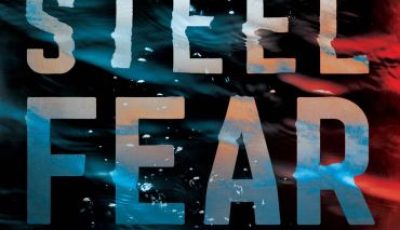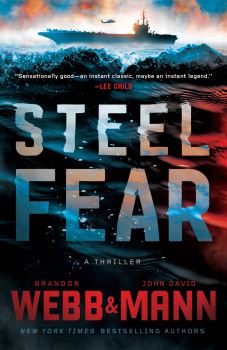

Steel Fear by Brandon Webb & John David Mann
 The moment Navy SEAL sniper Finn sets foot on the USS Abraham Lincoln to hitch a ride home from the Persian Gulf, it’s clear something is deeply wrong. Leadership is weak. Morale is low. And when crew members start disappearing one by one, what at first seems like a random string of suicides soon reveals something far more sinister: There’s a serial killer on board. Suspicion falls on Finn, the newcomer to the ship. After all, he’s being sent home in disgrace, recalled from the field under the dark cloud of a mission gone horribly wrong. He’s also a lone wolf, haunted by gaps in his memory and the elusive sense that something he missed may have contributed to civilian deaths on his last assignment. Finding the killer offers a chance at redemption . . . if he can stay alive long enough to prove it isn’t him.
The moment Navy SEAL sniper Finn sets foot on the USS Abraham Lincoln to hitch a ride home from the Persian Gulf, it’s clear something is deeply wrong. Leadership is weak. Morale is low. And when crew members start disappearing one by one, what at first seems like a random string of suicides soon reveals something far more sinister: There’s a serial killer on board. Suspicion falls on Finn, the newcomer to the ship. After all, he’s being sent home in disgrace, recalled from the field under the dark cloud of a mission gone horribly wrong. He’s also a lone wolf, haunted by gaps in his memory and the elusive sense that something he missed may have contributed to civilian deaths on his last assignment. Finding the killer offers a chance at redemption . . . if he can stay alive long enough to prove it isn’t him.
John David Mann recently spent some time with The Big Thrill discussing his latest collaborated thriller, STEEL FEAR:
What do you hope readers will take away from this book?
First, that leadership matters. The only reason the horrifically malfeasant actions of the killer in STEEL FEAR can flourish the way they do is because of the abysmal onboard culture, which stems from the actions (and inactions) of the captain. So there are really two villains here: the actual murderer and the fragile-egoed, small-minded captain whose failed leadership creates a context for evil to take root.
What attracts you to this book’s genre?
First, the extraordinary quality of writing I’ve found in my crime-fiction heroes! There’s something about a life-or-death context (and especially of the murder-or-survival kind) that seems to etch human character into bold relief. Start dealing with murder, and you’re plunged into the heart of what makes us human.
What was the biggest challenge this book presented? What about the biggest opportunity?
Having the whole thing contained on an aircraft carrier was an enormous challenge. First, the challenge of conveying to the reader the enormity and complexity of the place. And even more, US naval culture tends to be a very buttoned-up, disciplined thing. No booze. No fraternizing. (Both of those in theory, anyway.) You don’t have bar fights, your hero facing off against a gang in the streets, or other opportunities for violence. So it’s a slooooow build. The other big challenge was stretching out the story to a full month (to allow for passage from the Persian Gulf to Hawaii) without the story dragging. It was a master class in pacing—the “master” here being the demands of the readership.
Was there anything new you discovered, or that surprised you, as you wrote this book?
Yes: the nearly limitless need to revise and rewrite. I’ve written a lot of books, but all nonfiction—and I’ve never come close to the amount of revision, tightening, revising, and compressing as this. First draft: 153,000 words. Final: 103,000. And with each cut, each compression, each painful choice, the narrative line got better.
Without spoilers, are there any genre conventions you wanted to upend or challenge with this book?
One is the broad public concept of “Navy SEAL.” These guys are physically strong, yes, but they’re not an army of Schwarzeneggers. What distinguishes a SEAL is #1 a state of mind: mental resourcefulness, ability to focus, intellectual curiosity. And while a SEAL sniper is of course a skilled sharpshooter, he is first and foremost an intelligence asset. Finn is a unique character, for sure… But as a sort of anti-SEAL, he’s more SEAL-like than some might assume.
No spoilers, but what can you tell us about your book that we won’t find in the jacket copy or the PR material?
Two things. First is that it is really a leadership parable disguised as a crime novel. Leadership great and terrible, and the consequences that flow from both, is a topic that has always fascinated both of us. And second, while the main storyline is of course fictional, an enormous amount of detail is borrowed in whole or part from real-life characters, situations, and events. (Some we can say, some we can’t!)
What authors or books have influenced your career as a writer, and why?
Oft-cited giants—Raymond Chandler, John D. MacDonald, Dennis Lehane, Bob Crais, Lee Child—were who got me intrigued. They showed me the phenomenal range and breadth of what was possible. But the biggest two influences have been Tana French and Kate Atkinson, both for the nuance and gorgeousness of their prose and the depth of humanity they paint. I think Atkinson is the most poignantly *human* author I know.
Is there a question that you feel is important to you and/or your novel? Write it in below, but be sure to answer it too!
Q: How does your background in music figure into your writing?
A: I started out as a concert cellist and classical composer. Music is my native tongue; I’m always thinking in musical terms. The biggest challenges in making STEEL FEAR work were questions of pacing, contrast, the relationship of interior reflection and external events, and the long-range revelation of answers to myriad questions—for me all these are musical questions.
If you co-authored the book with someone else: What was the most challenging part of the co-authoring relationship?
I coauthored this with a former Navy SEAL sniper, Brandon Webb; we have worked on a handful of nonfiction projects before. Honestly, I cannot think of a single challenge; we work together like <Forrest Gump voice> peas ‘n’ carrots. We also bring completely different skill sets and backgrounds to the table; it’s a good division of labor.
*****
John David Mann is the award-winning coauthor of 30 books, including four New York Times bestsellers and five national bestsellers. His bestselling classic The Go-Giver (with Bob Burg) won the Living Now Book Award’s Evergreen Medal for its “contribution to positive global change.” STEEL FEAR, his first novel with former Navy SEAL Brandon Webb, releases on July 13. Iconic Jack Reacher author Lee Child has called it “sensationally good—an instant classic, maybe an instant legend.”
To learn more about the author and his work, please visit his website.
- Booktrib Spotlight: Laurie L. Dove - January 6, 2025
- Africa Scene: Kwei Quartey by Michael Sears - January 6, 2025
- Bye Bye Blackbird by Elizabeth Crowens - January 6, 2025

